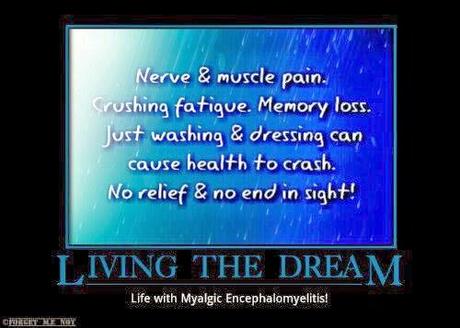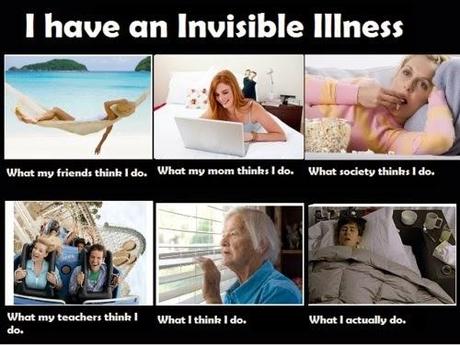These posts relating to highlighting certain diseases are, up until now, ones I have and have experience with. Today's is slightly different as it is not a disease I have, BUT it is a disease I was told I had for 10 years. This is CFS or chronic fatigue syndrome and to say it is debilitating is an understatement, even now that I know I don't have it, the years spent researching it, meeting others with it and genuinely believing this was the answer to all my illness have taught me that it is a cruel place to live. My only other experience with this disease is when my father experienced it in the 90's. He was lucky and it eventually dissipated/went into remission, however for many this is a life long chronic illness.

So what is CFS or M.E?
Firstly I would like to say that M.E (Myalgic Encephalomeylitis) is the same as chronic fatigue syndrome, it is just another common name for the disease. Myaligic literally means muscle pain and encephalomeylitis means inflammation of the brain.
CFS currently affects around 300,000 people in the UK and this is only the people who are diagnosed; it is estimated that a further 200,000 go undiagnosed. There are many reasons for this, but the main one is that some doctors still aren't open to the idea that it exists as a stand alone condition. Then there is the fact that some people simply carry on with their lives as they just think they are tired. It is such a varied disease and as everyone will experience different symptoms, it is very difficult to pin down.
Chronic fatigue syndrome for starters, does as the name suggests; it causes extreme fatigue. However anyone with this condition will tell you that this is just the tip of the iceberg. Along with the fatigue that is not helped by rest or sleep, you may also experience;
- Widespread pain in muscles/joints
- Brain fog
- Limited mobility
- Immune system issues
- IBS
- Swollen Lymph nodes
- Sore throats
- Sleep disturbances
- Light sensitivity
- Less common symptoms of night sweats, dizziness, nausea and difficulty controlling body temperature.
Currently doctors will place you at diagnosis on a scale of mild, moderate and severe. If you have mild CFS you will be able to care for yourself, keep up with work even if you have to take rest days and have only very limited mobility. Moderate CFS is classed as someone who struggles with some daily activities, may not be able to keep a job and have fairly limited mobility. Severe CFS can lead to 24 hour care, extremely limited mobility and serious cognitive issues. All of this information can be found on the NHS website.
I would like to say here, that whether you have a mild case or a severe case, what you will read does not always match the impact upon your life. I was originally told I had mild CFS, but I still had to change the majority of my personal life to fit in with the illness. I was constantly catching bugs and I had many weeks off work, university and ultimately a limited social life.
How long CFS lasts is also a bit of an enigma. It is classed as a chronic illness, which means life long unfortunately. However my dad experienced M.E for a short period of time before recovering and from researching it does look like some people have gone into a period of remission, however these are a case by case basis, so I think we should take it as a life long disease. It is a bit of an enigma in general which is exactly why more research is needed.

What causes CFS?
As with so many of the diseases I have looked into, the simple answer is that no one knows; this is the same with lupus, sjogrens, scleroderma and so on. It could be genetic, it could be external factors and we have to come to terms with the fact that we may never get an answer. However in the case of CFS, there are some reasons for developing it that have been studied and found reliable.
- Viral infections. I know for me and my dad, that we both experienced a nasty virus before we began to develop symptoms. I remember mine clearly as a horrid case of the flu.
- Sleep disturbances. Much like Fibromyalgia, sleep patterns have been known to play their part as a cause.
- Traumatic events. Grief and stress are so damaging that they have been said to work as a doorway to certain conditions developing.
- Genetics. I am not sure where researchers are standing on this, but as with any type of disease I think genes probably play their part.
- Hormonal imbalance. Hormones can cause so many issues, that this is probably a safe bet also.
As no one is sure of the cause, there are no blood tests that pin point the disease and many doctors are quite frankly afraid to diagnose it, treating CFS is a case of addressing the symptoms rather than the cause. This is what I found for 10 years. I was given pain medication for the extreme burning in my bones, sleep medication to get me through the night and counseling for my cognitive issues.
In general, you will be offered a combination of each of these, any medication or lifestyle change that addresses some of the symptoms.
CBT - Cognitive Behavioral Therapy
This is most commonly offered to help you both cope with the diagnosis and to make small changes to your life in order to help yourself in the future. This is also a widely used treatment for Lupus, depression, fibromyalgia and so on. I personally found this to be extremely useful, not for treating symptoms but for learning how to cope with the changes that I was facing.
If you suffer from brain fog caused by your CFS or another illness, then I would recommend CBT as a useful tool for helping you to make lists, remember important information etc.
Pain Medication
As a general rule, doctors will usually give you an NSAID for inflammation, such as Naproxen and then, possibly, a codeine based medication. There are also some over the counter items that I found really helpful for the pain and still do. Deep heat is excellent for any back issues, heat patches and cold patches are also really useful to carry around with you. Along with these I preferred to use the stronger medications with one of the heat pads as I wasn't taking too many painkillers, although I understand this will be down to how much pain you are in.
Sleep disturbances
If you experience sleep disturbances then you may well be offered one of many sleep medications. Some are anti depressants and some are sleeping tablets. I shall not go into details as it really is case by case. I currently take Amitryptiline for sleep issues caused by the lupus. I have found them extremely useful for getting into a REM sleep cycle, however this is me and everyone is different.
I would love to tell you what to expect from the future with CFS. The fact is that I can't, I can only tell you the facts as I know them. It is unpredictable and chronic, much like lupus. There is not enough information available, not enough understanding and certainly not enough research being conducted. I remember trying to explain what CFS is to people and they simply had never heard of it, or they believed it was all in my head. The more people that read this, the more I hope I can do to help raise it as an issue so that others don't have to struggle like I did.
If you have CFS and want to share your story please do!
